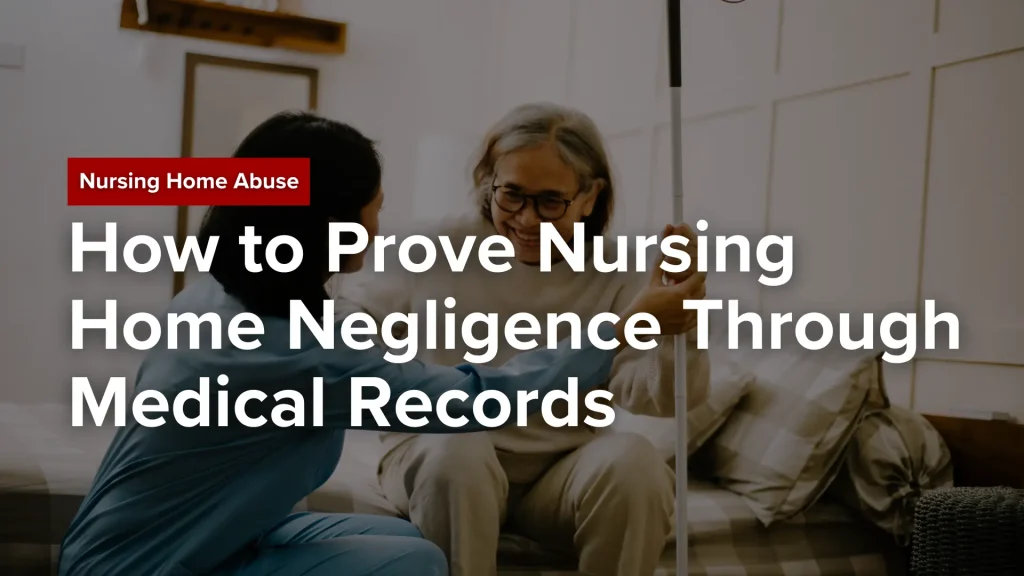 Families should be able to trust nursing homes to give their loved ones the care and attention they deserve. Unfortunately, when negligence does happen, elderly and vulnerable residents may be unable to advocate for themselves. That’s why nursing home negligence medical records play such a critical role.
Families should be able to trust nursing homes to give their loved ones the care and attention they deserve. Unfortunately, when negligence does happen, elderly and vulnerable residents may be unable to advocate for themselves. That’s why nursing home negligence medical records play such a critical role.
Your loved one’s nursing home negligence medical records are one of the strongest indicators of possible negligence, and they are instrumental to a future legal claim you may file against the facility. In today’s post, we’ll share the potential signs of negligence you should look for across the different types of medical records and how lawyers use them to build cases.
The Elements of Nursing Home Negligence
Nursing home proves negligence happens when a facility breaches established care standards and causes harm to a resident. To prove that a nursing home was negligent, you must show these four basic facts, or “elements:”
- Duty of care – The nursing home must provide care to its residents under established professional standards.
- Violation of duty of care – A nursing home’s staff violated their duty of care to your loved one, whether through their legal actions or lack of action.
- Direct harm – The nursing home’s actions directly caused your loved one’s injury.
- Damages – Your loved one has damages and losses resulting from the injury.
Some negligent incidents constitute neglect, which Illinois law defines as withholding or failing to provide adequate care. Other incidents constitute abuse, which occurs when a staff member deliberately inflicts a physical or mental injury on a resident or sexually assaults them.
How Medical Records Support a Negligence Claim
Under Chapter 735, Section 5/8-2001(b) of the Illinois Compiled Statutes, nursing home residents and their authorized representatives can access their medical records. The information inside medical records can answer these questions for a jury:
- Did a nursing home follow doctors’ orders, administer medications correctly, and perform necessary treatments properly?
- How does the resident’s injury directly connect to a breach of care?
- How severe was the harm that the resident suffered?
- What treatment is the resident receiving related to their injury?
Medical records usually accompany expert witness testimony, which can help jurors without medical training understand the complex jargon inside.
What to Look for in Nursing Home Medical Records
Title 77 of the Illinois Administrative Code outlines what information must be included in nursing home records. Your lawyer can obtain and review each of the following components:
- Admission records – These records include the resident’s initial condition, care plan, and needs assessment. A jury can then more objectively determine whether the resident’s health improved or worsened from the baseline.
- Medical history – A resident’s medical history details pre-existing conditions that affect their care needs.
- Physician’s orders – This section includes the resident’s prescribed treatments, medications, and care protocols. You can use them to show whether staff were diligent in following the prescribed plan.
- Nurse notes – Nurses should enter daily observations and record the care they provide to residents.
- Medication administrative records (MARs) – MARs detail when and how the resident received medications. They are particularly prone to contradictions or omissions.
- Treatment records – These records detail a resident’s progress through physical therapy, wound care, or other specialized treatments.
- Lab results – Lab testing can reveal “invisible” or untreated conditions, such as infections or dehydration.
- Hospital transfer records – If a nursing home resident needs hospitalization, their medical records should detail the reason for the stay and what treatments they received. Transfer records can indicate a resident’s worsening condition, and frequent transfers can suggest inadequate care.
Records should be complete and consistent. If there are inconsistencies, your lawyer will further scrutinize them as signs of negligence.
Signs of Negligence or Abuse in Nursing Home Medical Records
No two nursing home incidents are alike. However, many share similar red flags that point to potential negligence. We encourage you to review your loved one’s records carefully for any of the following:
- Contradictions between a doctor’s orders and nursing notes
- Discrepancies between the two different staff members’ observations
- Recorded bruises, wounds, or fractures with no adequate explanation
- Documented unexplained weight loss
- Developing pressure sores
- Missed medication doses with no explanation
- Incorrect medication doses or administration of a contraindicated drug
- Repeated falls, infections, or hospital visits with no explanation
- Notes of severe symptoms that aren’t addressed quickly
Next Steps After Identifying Negligence in Medical Records
 If you see a potential sign of negligence, follow these steps to protect your loved one’s rights best:
If you see a potential sign of negligence, follow these steps to protect your loved one’s rights best:
- Request complete records – A nursing home resident’s authorized representatives have the right to obtain all of their medical records. Submit a records request in writing, either yourself or through your attorney, and verify that it includes all of the types of records listed above.
- Document everything – Keep a journal with your own observations of your loved one’s condition. You should also document concerns, future incidents, and communications that you or the resident have with facility staff.
- Consult an attorney – Your legal team can evaluate the records, identify signs of negligence, and determine if you may have a case.
- Get an expert review – Many nursing home attorneys have networks of medical experts across a wide range of specialties. They can help interpret more complex records and provide a professional opinion.
Time is of the essence with any nursing home negligence claim. Illinois’s statute of limitations gives you two years from the date you discovered the injury or negligence to file a lawsuit. The sooner you find a lawyer you trust, the more time they’ll have to prepare a strong nursing home negligence case.
Contact a Chicago Nursing Home Negligence Attorney
For over 50 years, the Chicagoland team at Karlin, Fleisher & Falkenberg, LLC has helped clients pursue justice after nursing homes mistreated them or their loved ones. We work on your behalf to obtain the correct medical records and will use our network of talented medical experts to identify signs of negligence and build the strongest case we can. We’ve used our thorough and aggressive approach to win five and six-figure settlements and awards in elder abuse claims, and we are ready to evaluate your case at no cost. Our team is here to help you understand your rights and take the first step toward securing the necessary benefits. Contact us online or call our office today at 312-346-8620 to speak with one of our nursing home negligence attorneys in Illinois.
